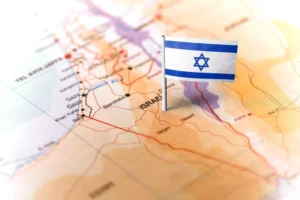Dr. Kent Brantly and his wife, Amber, put a name and face on the Ebola epidemic during the summer of 2014. The missionary couple was serving in Monrovia, Liberia, when Kent got the devastating news that he had contracted the deadly disease.
Kent was transferred to Emory University Hospital in Atlanta, where the nation awaited news of his recovery. He was featured in Time magazine, which named “The Ebola Doctors” as their 2014 Persons of the Year, and he was interviewed by many national news organizations.
Kent and Amber are graduates of Abilene Christian University and live with their two children in Texas, where Kent currently serves as the Medical Missions Advisor for Samaritan’s Purse. They tell their full story in their book, Called for Life. Recently, in an interview with Boundless, they shared what it was like to be at the front lines of the fight against Ebola and, in the process, become overnight celebrities.
1. Kent and Amber, tell us about your call to medical missions. Did you ever think you would face a life-or-death situation?
Amber: God calling me toward missions took place over years and years of family missions trips to Mexico, nursing missions trips during college and missions internships. It was growing inside of me, along with my natural inclinations for traveling and language learning and exploration. I think before we moved our family to Liberia, we knew that we might face dangers. While moving to our first missions site as a family, we prepared for dangers we did know about: We attended security training, we were vaccinated, we took a two-year supply of malaria prophylaxis. We did not know we would be facing an Ebola outbreak — who could have known? But we had given ourselves (our lives and our bodies) to the Lord long ago when we decided to follow Him, so we had peace in spite of our fear.
Kent: My calling came through experiences on short-term missions trips, through the voices of mentors and missionaries, and through the growth of my relationship with Jesus. I never could have anticipated the challenges we faced during our first months on the mission field or my near-death experience with Ebola. But I wouldn’t have done anything differently.
2. Kent, you only had one patient survive the Ebola outbreak where you were working, and then you came down with Ebola symptoms. What went through your mind? Amber, what were you thinking when you got the call telling you Kent had Ebola?
Kent: My first thoughts were, Ok, so what’s next? What’s our plan? and How am I going to tell Amber? I wasn’t thinking about my possible death in that moment. I was filled with a supernatural peace despite the devastating news I had just received. I called Amber and told her very matter-of-factly, “I’m sorry to tell you my test is positive for Ebola.” I never shed a tear through all of that. It wasn’t that I wasn’t scared or anxious. I was just filled with a very real sense of peace, knowing that despite my circumstance, I was doing what God had called me to do.
Amber: Kent called me himself, nearly as soon as he learned his diagnosis. When Kent told me — in his matter-of-fact way — I sat on the bed and cried. I wanted to be able to say something to him that would encourage him or strengthen him for the fight, but I could not come up with that. I just told him, “I’m sorry. I’m so, so sorry,” and “I love you.”
3. Kent, at the height of your illness, did you ever question why this was happening to you, a doctor who was doing so much good fighting Ebola? Amber, did you ever question God about why this was happening to your husband?
Kent: I never really questioned, “Why me?” in the midst of it all. God never promised that if we followed Him, we would always be safe. Doing good doesn’t protect you from danger when you are doing good in a dangerous situation. But there is peace, even in the midst of danger, when you know that you are following God’s calling. The harder question for me is not, “Why did I get Ebola?” but rather, “Why did I get such special treatment while so many in Liberia were dying?”
Amber: As it was happening, I did not question God, but I have questioned Him since. During the crisis, though, I could see the media attention that Kent and Nancy Writebol were receiving, and I knew that would be good in bringing more help to Liberia. I could see God working His good even through the evil in all of it. But now, a year later, I just wonder and marvel at how this all happened to us, and I have certainly grieved the loss of our home and community in Liberia.
4. Has it been hard to transition back to life in America after serving in Africa?
Amber: I believe that our transition back to America has been a somewhat unique one, because we came back kind of as celebrities in a way. That is, people recognized us in airports or restaurants. That’s a bit weird, and I think a lot of missionaries on home leave feel very lonely and out of place because nobody knows them or what they have been doing, and they just wish somebody, anybody would ask them to talk about their experiences. While we still sometimes feel lonely and a bit out of place, we have had more opportunities to speak than we know what to do with! It is easy to feel judgmental toward those who don’t think twice about the amount of money they’ll spend on coffee when you know people who live on less for the week. But God’s grace is sufficient for them as it is for me. And before too long, I’m the one buying expensive coffee.
Kent: There were days when we felt defeated and when hope seemed so far away, when the amount of death in the hospital was more than one could stand. But as an older missionary once told me, “When the going gets tough, the tough go back to their calling.” On our hard days, we have to remember who has called us, and who He has called us to be — no matter where we are.
5. Kent, in the book you write, “When I reflect on patients, I do not feel like my care was a failure. Even though they died, I feel that I did something more for them than treat their sickness. I did everything I could do to save their lives and could not, but I also had compassion on them. I entered into their suffering with them. I tried to offer back to them the dignity that Ebola was taking away.” What did it look like for you to offer dignity? What role did compassion play in your treatment plan?
Kent: In the setting of Ebola, to offer dignity to a patient was to treat them like a person and not like a dreaded disease. To call them by name. To tell them my name. To talk to them, to sing to them, to touch them (while wearing the appropriate protective equipment), to treat them with respect, even as they lost control of their bodily functions and their ability to care for themselves. Compassion is not a piece of a treatment plan — it is how you view and treat people. And this is not just true in a patient-doctor relationship. It is true in every interpersonal interaction we have, whatever our role.
To learn more about the Brantlys, purchase a copy of Called for Life or check out their website at CalledForLifeBook.com. You can also follow them on Twitter @CalledforLife.











